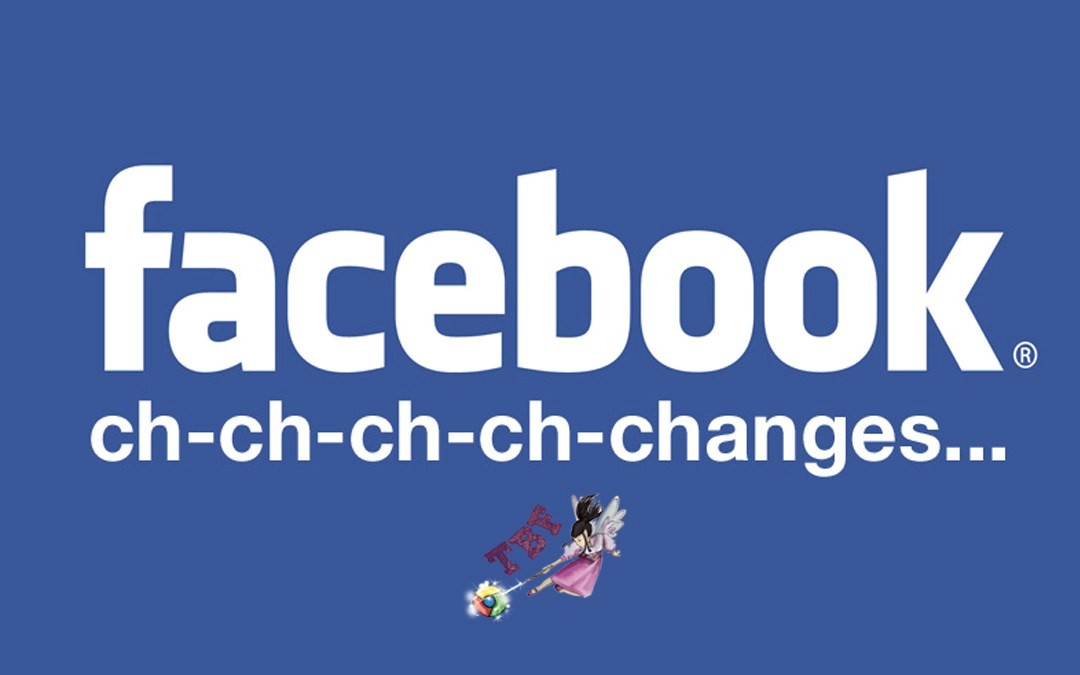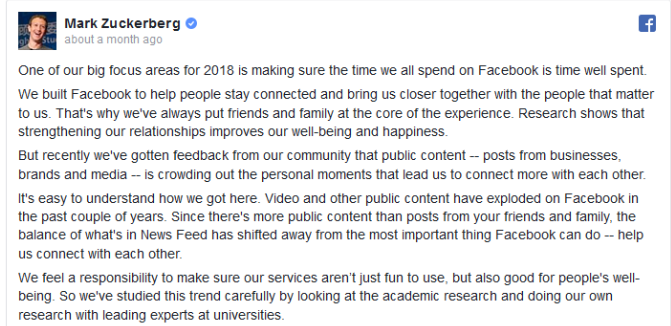
Facebook and the Tale of the Social Media Manager
Just when you think you’ve nailed your social media strategy – there’s a Facebook algorithm change. Oh Mr Zuckerberg, you do love keeping everyone on their toes now don’t you? Welcome to Facebook and the Tale of the social media manager.

So, what’s going on?
Well, Facebook wants to prioritise content from friends, families and groups over businesses and brands. The idea is to increase social engagement and encourage meaningful community interaction. This all sounds very heart warming and lovely – like we’re all about to virtually hug one another and share our life stories – but how will this affect online marketing? Let’s take a look at the recent updates through the eyes of a social media manager and find out how to handle the various changes.
Step One: Tears and tantrums (or something along those lines)
Your day’s going well. You’ve briefed your team, sent a few emails and have browsed the latest news. You really feel like the social manager of the year when suddenly, ping! A post from Facebook HQ – what’s going on? It starts off well talking about ‘friends and family’ and ‘time well spent.’ In fact, it takes Zuckerberg five sentences to throw in a ‘but’ – five whole sentences to hint that your marketing strategy will need some serious revision and that while you’re already busy (okay we added that bit); you’re going to have to graft. Not just graft, research and graft. But that’s ok right?
Here’s the opening snippet detailing the algorithm change:

OK, hurdle one dealt with – what’s next?
Step Two: My KPIs….my poor, poor KPIs
You’ve digested the initial information and now you have to watch as your metrics, social media analysis and carefully thought out KPIs go haywire. You see – the things that once were considered pretty good are no longer a priority thanks to the algorithm change. Things like:
- Content with external links
- Posts with plenty of likes and shares
- Video content (unless it generates meaningful conversations)
- Content that explicitly asks for user engagement
- Branded posts and advertisements from companies
Fighting a losing battle? Seems like it! It’s tough, you feel a little lost and lots of hard work now seems to have gone to waste. You know you have to quickly spruce up your knowledge and adapt to the changes but where do you start?
Step Three: The comeback
You’re a social media manager. Nothing gets you down. You’ve dealt with negative PR, you’ve dealt with compliance (especially if you’re in the finance sector) and now you’ll take on Facebook’s latest news feed shenanigans.
Not sure where to start? Well, here are several tips to consider:
- Brief your team
As a manager, it’s your responsibility to brief your team about the latest updates and ensure they’re well informed. Explain any changes to your market strategy and why it’s normal to see a drop in performance following the updated algorithm. Once everyone’s on the same page, you can then start implementing a spectacular comeback.
- Generate comments
According to Zuckerberg, ‘meaningful interaction’ means comments, comments and more comments. In his announcement he wrote: “Pages making posts that people generally don’t react to or comment on could see the biggest decreases in distribution. Pages whose posts prompt conversations between friends will see less of an effect.”
So, how can you generate content that people really want to engage with?
- Live video
Video is the king of the social media world with businesses posting an average of 18 videos per month. That said; live videos get up to six times more interactions than regular videos, so as long as you post interest, engaging live content that gets people talking you should be able to overcome the news feed hurdles that have been put in your way.
- Create events
Creating an event specifically for your target audience is sure to get chins wagging and this should result in increased social media attention. While you shouldn’t actively ask people to comment or respond to your post (according to the new algorithm), you can help them interact with your online material by coming up with innovative marketing efforts –knock up some innovative gifs, a video or an infographic about your company to promote the event.
If you don’t have an event coming up, why not keep your followers updated with what’s going on behind the scenes of your company? A nice how-to video or a documentary film of how a product’s made is sure to interest your specific target audience.
- Discuss local news and relevant topics
You only have to look at online papers to see the vast number of comments each story gets. People love sharing their opinions, so if you want to increase brand awareness without being overly promotional – publishing news is an excellent social marketing strategy. Of course, copying or simply rehashing old info is a big no-no, so always put your own stamp on anything you release to your social followers and give them a reason to get excited.
- Rock your niche
People follow you on Facebook because they like what you do – so rock your niche. Share things that others don’t know. Ignite their imaginations and ensure they stay interested in what you have to offer/what you do. You’re the experts, so stay on brand but don’t be afraid to do things differently from other companies if it means showcasing your knowledge. After all, educating people can lead to comments, inspiring people can lead to comments and entertaining people can lead to comments. And comments are good.
- Set up groups
Facebook Groups rely on audience engagement. Therefore, this marketing tactic is sure to be a winner under the new algorithm. Businesses should still pay attention to their main Facebook page while simultaneously looking into new ways to engage customers with groups and other advertising efforts.
Again, if the group goes quiet, throw a conversation starter in there. Perhaps something exciting happened in the news or a celebrity made a comment that you just can’t ignore.
- Don’t rely solely on Facebook
If Facebook played a significant role in your marketing strategy you may be feeling the algorithm change more than those who have dabbled in other tactics. While Facebook is still a great platform for marketers (so long as you adapt and make the relevant changes), you can get your content shared organically by updating other sites such as Instagram. And then there’s Twitter, YouTube, Snapchat and other platforms which can also be explored. Social media managers have a wealth of tools at their fingertips – you’ve just got to use them.
How are you adapting to the change as a social media manager? Tweet me @Charli_Says and let me know.

